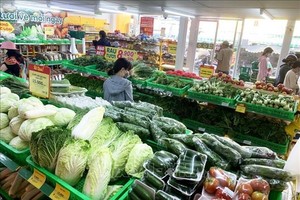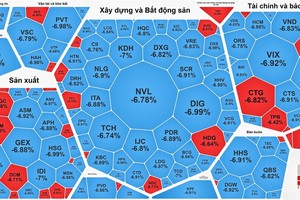
Prices of vegetables, meat, and fish slightly increased
At Hoa Hung Market in District 10, Go Vap Market in Go Vap District, and Hoang Hoa Tham Market in Tan Binh District, the number of customers is relatively small, while food is abundant and diverse. Many types of fresh products and foods, such as meat, fish, seafood, vegetables, and fruits, slightly edged up by VND1,000-VND5,000 per kg. For example, a kilogram of lettuce cost nearly VND30,000 before the pandemic. Up to now, many small traders have had to increase to VND34,000 kg to make up for the transportation cost to earn a profit.
Some small traders said that price hikes in all kinds of goods had directly affected the purchasing power of consumers and their revenues. From now until the end of the year, prices of foods and commodities are also predicted to increase sharply if gas and petrol prices show no signs of a downward trend. Nguyen Chau Lam, a small trader at Hoa Hung Market in District 10, said that she mainly purchased foods from wholesale markets, the prices of many foods had cooled down sharply compared to those during social distancing. However, prices had started to go up slightly again in the past week due to increasing freight charges. On average, each box of goods rose by dozens of thousands of Vietnamese dong. She was worried that the increase in food prices would directly affect the purchasing power and her income.
Impact on many aspects
In comparison to the previous time, many types of cooking oil have tended to climb by VND3,000-VND5,000 per bottle. Specifically, a liter of Happy Koki cooking oil advanced to VND40,000, and a liter of Neptune cooking oil surged to VND52,000. Nguyen Thi Phuong, a resident in Binh Thanh District, said that the price of vegetables and fruits had also increased. Scallions were sold at more than VND80,000 per kg. Not only food but incense and candle products had also rallied rapidly. “A bunch of incense used to fetch VND75,000, but now it has risen to VND80,000," Phuong said.
At Binh Thoi Market in District 11, some small traders said that the price of goods increased slightly by VND1,000-VND2,000. “Despite increasing freight rates, inconvenient transportation, and rising gasoline prices, traders are trying to keep prices moderate to retain customers amid economic difficulties,” said a small trader.
Not only fresh food, but a variety of drinks, cooked food, and street food, such as coffee, broken rice, rice noodle soup, vermicelli, and pho, are also about to increase prices due to the influence of gasoline and gas prices. In Go Vap District, on average, a plate of broken rice cost VND25,000-VND30,000 before the pandemic. But now, many eateries have simultaneously raised their prices to VND30,000-VND35,000. Many coffee shops have also augmented an average of VND1,000-VND2,000 per glass of drinks to cover other incurred costs.
Recently, gasoline prices have continuously increased, causing headaches to many fishers nationwide. Meanwhile, seafood prices have not recovered as expected, leading to many difficulties in fishing activities, forcing them to suspend operations of fishing vessels. Chairman of the Fisheries Association of Rach Gia City Truong Van Ngu said that in the past two months, increasing fuel prices, the Covid-19 testing cost, and the supporting cost for crew members' families had discouraged many fishing vessel owners from being eager to go to the sea because fishing was not lucrative. He estimated that with the current fuel prices, fishing boat owners would have to spend about VND60 million more for each trip.
According to preliminary statistics, only about 50 percent of the members of the Rach Gia City Fisheries Association still maintain operations. According to the Department of Agriculture and Rural Development of Ba Ria - Vung Tau Province, the whole province has more than 2,800 offshore fishing vessels, but currently, about one-third of them does not go to the sea for fishing.
The volume of goods arrived at wholesale market remains low
On November 16, Director of Hoc Mon Wholesale Market Management Company Nguyen Tien Dung said that the number of traders returning to the market had reached about 80 percent, but the volume of goods imported to the market was still low, fluctuating around 1,500-1,600 tons per night, accounting for about 60 percent of that before the pandemic. Noticeably, the situation of spontaneous markets around the market had decreased but remained complicated.
Meanwhile, a representative of Binh Dien Wholesale Market Management Company said that after reopening for half a month under the state of new normal, with an allowed capacity of 30 percent of stalls, but so far, its capacity has only reached about 15 percent. Daily imports of goods into the market is at about 300 tons while it exceeded 2,000 tons before the pandemic. It is because the spontaneous market around the market shows no signs of dismissal but becomes more and more booming. The tight Covid-19 control when entering the market makes many shoppers reluctant to go to the market, so traders in Binh Dien Market are forced to carry their goods back to the streets and nearby vacant land to sell.
























